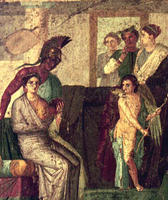
I've just finished reading "Course of Honour" by Lindsey Davis. For some reason I was under the impression that a Roman male citizen could marry a freedwoman and that manumitting a female slave was commonly done for this purpose. However, in Davis' book, Antonia Caenis could not marry Vespasian, even after she was freed, because he was a senator. I wondered about this but found this reference describing the points of Justinian's law to support her research:
A Senator cannot marry a freedwoman except with imperial permission. The daughter, grand-daughter, great-granddaughter of a Senator cannot marry a freedman or an actor. Justinian relaxed this rule briefly but then changed his mind and reinstated it. (Since Justinian reinstated this law, it must have already been in existence at the time of his reign)
A patron cannot marry a freedwoman against her will, unless he manumitted her for the purpose of marriage.
I was also interested to note that this reference points out that:
If a wife absents herself for three days every year she will remain in the power of her father (or other male kinsman) rather than fall under the authority of her husband. Normally a father or brother could be counted on to be more benevolent and were certainly more remote. This marriage ?without manus? was the norm throughout the time of the Empire.
A daughter married "with manus" passed into the power of her husband. Such a marriage was quite rare, however, and daughters usually remained in the power of their birth family. (Note: this meant that any property the wife owned outside of her dowry and prenuptial donation remained in her family. Her husband administered the dowry and prenuptial donation and was certainly the "head of the house" on a day to day basis.
Things apparently really got complicated if you were a Roman in Alexandria:
Marriage and inheritance. Alexandria, 2nd cent. A.D. (Berlin papyrus 1210. Tr. J.G. Winter. G)
The idiologus, the chief financial officer of Roman Egypt, administered the imperial account, which consisted of funds acquired form means of than taxation (fines and confiscations, for example). The papyrus from which these extracts are taken contains a summary of the rules by which the idiologus carried out his duties. This document reveals fiscal oppressions not only of women but of an entire province.
6. An Alexandrian, having no children by his wife, may not bequeath to her more than one quarter of his estate; if he does have children by her, her share may not exceed those of each son.
23. It is not permitted to Romans to marry their sisters or their aunts; it is permitted in the case of the daughter of brothers. [The idiologus] Pardalas, however, confiscated the property when brothers and sisters married.
24. After death, the fiscus [40] takes the dowry given by a Roman woman over 50 to a Roman man under 60.
26. And when a Latina [41] over 50 gives something to one over 60 it is likewise confiscated.
27. What is inherited by a Roman of 60 years, who was neither child nor wife, is confiscated. If he have a wife but no children and register himself, the half is conceded to him.
28. If a woman is 50 years old, she does not inherit; if she is younger and has three children, she inherits;[42] but if she is a freedwoman, she inherits if she has four children.
29. A free-born Roman woman who has an estate of 20,000 sesterces, so long as she is unmarried, pays a hundredth part annually; and a freedwoman who has an estate of 20,000 sesterces pays the same until she marries.
30. The inheritances left to Roman women possessing 50,000 sesterces, who are unmarried and childless, are confiscated.
31. It is permitted a Roman woman to leave her husband a tenth of her property; if she leaves more, it is confiscated.
32. Romans who have more than 100,000 sesterces, and are unmarried and childless, do not inherit; those who have less, do.
33. It is not permitted to a Roman woman to dispose of her property by will without a stipulated clause of the so-called coemptio fiduciaria. [43] A legacy by a Roman woman to a Roman woman who is a minor is confiscated.
38. The children of a woman who is a citizen of Alexandria and an Egyptian man remains Egyptians, but inherit from both parents.
39. When a Roman man or a Roman woman marries a citizen of Alexandria or an Egyptian, without knowledge (of the true status), the children follow the lower class.
46. To Roman men and citizens of Alexandria who married Egyptian women without knowledge (of their true status) it was granted, in addition to freedom from responsibility, also that the children follow the father's station.
52. It is permitted Roman men to marry Egyptian women.
53. Egyptian women married to ex-soldiers come under the clause of misrepresentation if they characterise themselves in business transactions as Roman women.
54. Ursus [44] did not allow an ex-soldier's daughter who had become a Roman citizen to inherit from her mother if the latter was an Egyptian.
http://www.stoa.org/diotima/anthology/wlgr/wlgr-romanlegal148.shtml

 They had by now consumed the mules, horses and other animals which a desperate plight compels men to use as food, however unclean and revolting. Finally they were reduced to tearing up shrubs, roots and the blades of grass growing between the stones - a striking lesson in the meaning of privation and endurance.
They had by now consumed the mules, horses and other animals which a desperate plight compels men to use as food, however unclean and revolting. Finally they were reduced to tearing up shrubs, roots and the blades of grass growing between the stones - a striking lesson in the meaning of privation and endurance.
